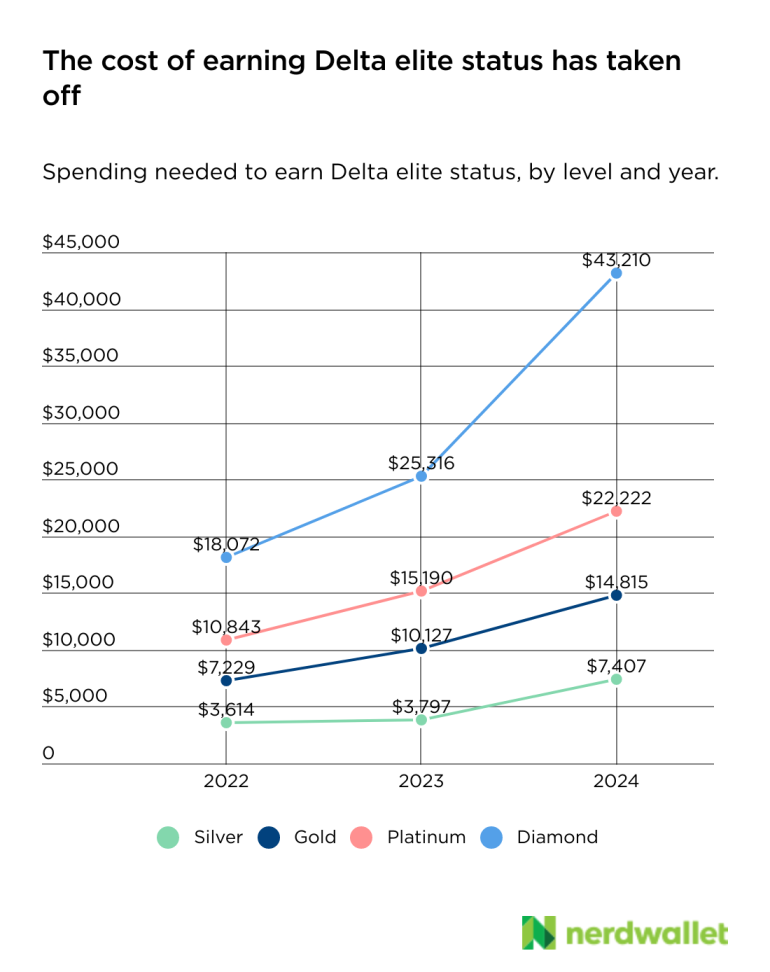The first time I earned status on an airline, it was an accident. I booked a super-cheap Emirates business class flight to New Zealand and applied my Alaska Airlines account to the itinerary. It turns out, I flew far enough (and in a fancy enough cabin) to earn Alaska’s lowest-level MVP status with a single flight.
Basically, I got to act like a high roller while only spending like a medium roller.
Alaska’s elite status program is among the few left based on the distance flown. Other big airlines now require minimum spending requirements to earn each elite level, which means there’s no way for penny-pinching travelers to sneak their way into platinum and adamantium tiers.
Delta Air Lines recently announced changes to its Medallion program that, because of massively increased spending requirements, make it even harder for budget travelers like me to earn elite status next year. That comes on the heels of a similar inflationary change in 2023.
The reactions from customers weren’t pretty.
Basically, Delta determined that the problem with its elite status program was that it wasn’t elite enough. So it kicked all the medium rollers out of its club.
If you were wondering whether this change comes as a cost-cutting measure made by a financially beleaguered airline, the short answer is: Nope. Delta earned a record $2.5 billion in profit last quarter (yes, last quarter), according to its most recent earnings report.
So what are these changes about? And what do they mean for frequent travelers?
Bad news bearer
Delta billed these changes as a net positive for travelers, claiming they were “simpler and more rewarding.”
“Simpler” I’ll grant, because there was no other direction for it to go. Travelers used to earn Medallion status through a complicated system of Medallion Qualification Miles, Medallion Qualification Segments and Medallion Qualification Dollars. They’ve stripped the first two away, leaving dollars (amount spent) as the sole qualifying criterion.
“More rewarding” is a stretch unless Delta is referring to itself as the beneficiary of these rewards. It’s like saying that $5 gas is good for consumers’ finances, and by “consumers” you mean “oil executives.”
Delta increased the spending threshold (MQDs) for all of its Medallion levels, in some cases dramatically.

The cost to earn each status level has more than doubled in just two years. The earning requirements for Diamond status are a whopping 139% higher in 2024 than in 2022.
Those increases make other travel prices — which have risen 12% since 2019, according to the NerdWallet Travel Price Index — seem downright moderate. In fact, if you spend the same amount with Delta in 2024 as you did in 2022, you can expect to earn one full lower level of elite status.
Only 35,000 Medallion Qualification Dollars are required to earn Diamond status in 2024, but those are earned on the base fare of the ticket, excluding taxes and fees. Based on a NerdWallet analysis of base fares, this totals about $43,210 in real dollars required to earn Diamond status.
Delta has shifted the way Medallion Qualification Dollars can be earned, so you can now get them if you book car rentals and hotels along with your flight. The only problem with this approach is that you shouldn’t book travel that way. So this isn’t much, if any, of a benefit for most travelers.
The business of travel is business travel
Elite status programs were never built for leisure travelers like me and (presumably) you. They have always been geared to attract the true whales of the aviation industry: Frequent business travelers.
The thing is, business travel still hasn’t returned to pre-pandemic levels. Corporate travel spending is expected to reach 71% of 2019 levels in the second half of this year, according to a 2023 survey of 334 travel managers by Deloitte, a consulting firm. Even by 2024, this kind of spending is expected to remain lower than in 2019.
All of this makes Delta’s recent changes even more baffling. Corporations are spending less on travel, which in turn affects the budgets of frequent travelers. Yet Delta has doubled the spending requirements for these all-important customers to earn elite status.
It will be interesting to see how other major airline loyalty programs respond to Delta’s high-roller-ification. Airline programs tend to move like schools of fish, so it wouldn’t be surprising to see, for instance, United follow suit. (In fact, American Airlines had moved to an elite status program based on money spent before Delta did.) That said, these unpopular changes create an opportunity for other programs to attract disgruntled Delta elites by offering friendlier policies.
Did I mention that Alaska still rewards elite status based on the actual distance flown, not the amount spent? It’s a big reason it perpetually wins NerdWallet’s annual rankings of elite status programs.
Womp womp
The truth is, these loyalty programs care little about what a lightweight leisure traveler like me thinks. My goal is to minimize the amount I spend to earn status and maximize the benefits I get.
Pay attention to changes like these and make informed decisions about where you spend your airline dollars. Factors to consider include:
- How much do you typically spend per year?
- Which airlines offer the best bang for your buck?
- Which benefits do you care most (seat upgrades?) and least (priority boarding?) about?
Don’t just choose your preferred airline based on which one has the best Biscoff cookies. Compare what programs offer and (importantly) how much they expect you to spend. Even medium-rollers like us deserve to feel elite.
The article Ask a Travel Nerd: Why Delta’s Elite Status Changes Matter originally appeared on NerdWallet.